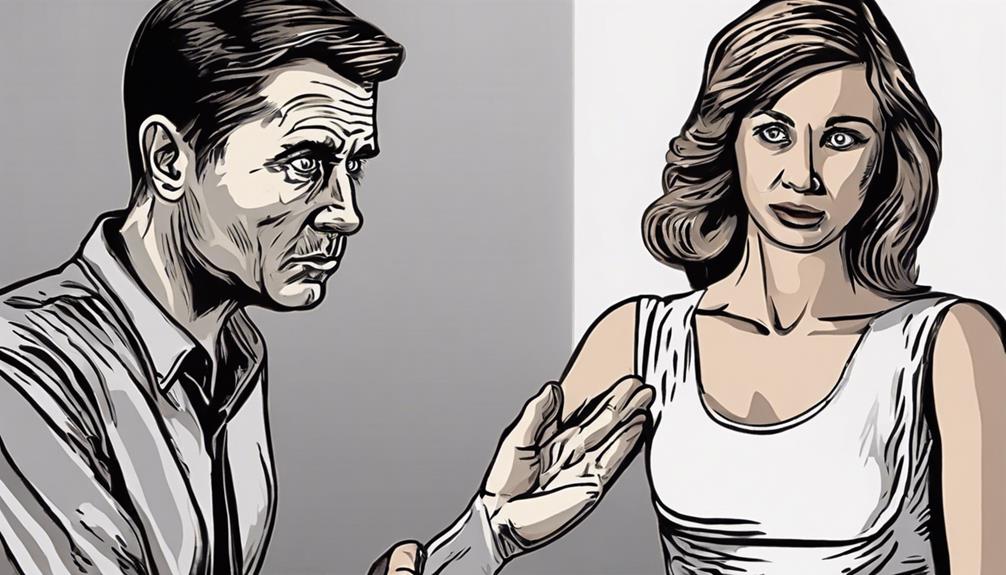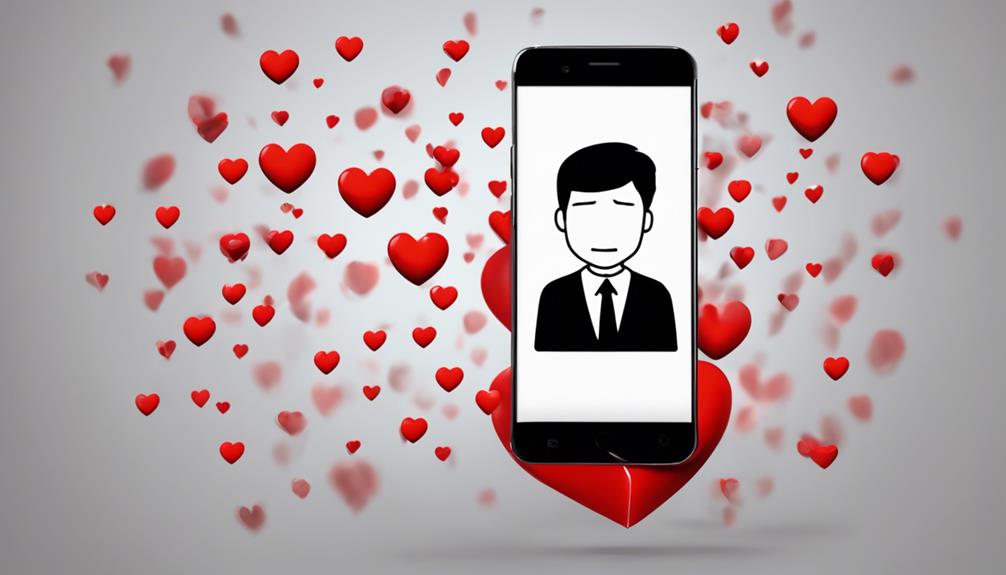Encountering disrespect within a relationship can make it difficult to determine when and how to stand up for oneself. Nonetheless, we have put together a comprehensive, easy-to-follow guide designed to empower us to handle these scenarios with both assertiveness and clear understanding.
From recognizing subtle signs of disrespect to asserting our boundaries firmly, each stage of this guide equips us with the tools needed to handle disrespectful behavior effectively.
So, how can we ensure that our self-respect remains intact while cutting off someone who crosses the line? Let's explore the first crucial step in this empowering process together.
Key Takeaways
- Acknowledge disrespectful behavior promptly.
- Set and enforce clear boundaries.
- Implement the No Contact Rule decisively.
- Communicate your decision firmly and respectfully.
Recognizing Disrespect
Recognizing disrespect begins with acknowledging the subtle signs of belittling, controlling, or manipulative behavior in our interactions. When we encounter disrespectful behavior such as rudeness, dishonesty, or lack of empathy, it's crucial to understand these red flags as indicators of potential harm. By recognizing these signs of disrespect, we empower ourselves to set clear boundaries and maintain our self-respect. Understanding disrespectful behavior isn't just about identifying it in others but also about valuing ourselves enough to know that we deserve to be treated with dignity and kindness.
Setting personal boundaries is essential in any relationship, both personal and professional. By recognizing disrespect early on, we can feel more in control of our interactions and establish healthy boundaries that protect our well-being. It's important to remember that we're worthy of respect and shouldn't tolerate behavior that undermines our worth. As we learn to recognize disrespect, we can navigate relationships more effectively and create environments where we feel valued and respected.
Setting Personal Boundaries

Setting personal boundaries is crucial for maintaining self-respect and protecting our well-being in relationships. It's essential to clearly define these boundaries and communicate them assertively to others. By doing so, we establish the standards for how we expect to be treated and what behaviors are unacceptable.
Identifying disrespectful behaviors that cross these boundaries is key to recognizing when our limits are being violated. Prioritizing our well-being means enforcing consequences when these boundaries are disregarded, showing that we value ourselves and our limits.
Adjusting boundaries as needed based on our comfort level and self-respect is empowering and allows for personal growth within relationships. Seeking support from friends, family, or professionals can provide guidance and reinforcement when maintaining these boundaries becomes challenging.
Implementing the No Contact Rule
When implementing the No Contact Rule with a disrespectful individual, prioritizing your emotional well-being is paramount. It is essential to address the impact the toxic relationship has had on your mental health, self-esteem, and confidence. Implementing this rule means creating space and boundaries to focus on healing from the toxicity. Blocking all forms of contact, including calls, texts, and social media, is crucial in this process. By enforcing the no contact rule, you show that you value yourself and will not tolerate disrespect.
| Benefits of Implementing the No Contact Rule | How it Helps |
|---|---|
| Creates space and boundaries | Prioritizes emotional well-being |
| Allows focus on self-healing | Rebuilds self-esteem and confidence |
| Signals self-value and intolerance for disrespect | Promotes mental health recovery |
Taking these steps is a significant stride towards breaking free from a harmful dynamic and reclaiming your sense of self-worth. Remember, it's okay to put yourself first in order to cultivate a healthier and happier life.
Communicating Your Decision

To effectively convey your decision to cut off a disrespectful individual, ensure your communication is direct and unambiguous. Use assertive language to clearly communicate your boundaries and reasons for ending the relationship.
It's crucial to avoid getting into arguments or over-justifying your decision, as this can muddy the message you're trying to convey. By making it clear that your decision is final and non-negotiable, you prevent confusion and any false hope of reconciliation.
Remember to communicate your decision respectfully yet firmly, emphasizing the importance of self-respect in all interactions. This approach not only helps you maintain your boundaries but also sets a precedent for how you expect to be treated in the future.
Finding Support
As you navigate through the challenging process of cutting off a disrespectful individual, finding support from understanding friends and family, trained therapists, support groups, and helplines can provide vital emotional and professional guidance. Here are three ways to seek the support you need:
- Surround yourself with supportive friends and family: Lean on those who understand your situation and can offer emotional support during this difficult time. Having a strong support system can help you feel validated and cared for as you make this tough decision.
- Seek guidance from therapists or counselors: Professional advice from trained professionals can assist you in navigating the process of cutting off someone who disrespects you. Therapists can provide valuable insights and strategies to help you prioritize your mental health and well-being.
- Join support groups or online communities: Connecting with others who've faced similar experiences can offer a sense of belonging and understanding. These communities can provide a safe space to share your story, gain support, and access resources for mental health care.
Frequently Asked Questions
How Do You Make Him Stop Disrespecting You?
We assert our worth through clear communication and boundaries. Holding him accountable for disrespect is crucial. Seek support to maintain boundaries. Prioritize safety and well-being; if disrespect persists, cutting off communication may be necessary for self-respect and growth.
How Do You Politely Cut a Guy Off?
When it's time to politely cut a guy off, we approach it with grace and clarity. We express our boundaries firmly and respectfully, ensuring our well-being is prioritized. Ending things kindly, but decisively, is key.
How Do You Walk Away From a Disrespectful Man?
When dealing with a disrespectful man, we recognize the importance of setting boundaries, communicating assertively, and prioritizing our well-being. It's crucial to seek support, implement the no contact rule, and focus on personal growth.
How Do You End It With Someone Who Disrespects You?
We prioritize our well-being by clearly communicating our decision to end the relationship firmly and seek support from loved ones. We avoid contact, stay committed to our choice, and implement the no contact rule to establish boundaries.
Conclusion
In recognizing disrespect, setting boundaries, implementing no contact, communicating our decision, and finding support, we empower ourselves to prioritize self-care and well-being.
By cutting off those who disrespect us, we pave the way for healthier relationships and personal growth.
Remember, valuing ourselves is the first step to building a better future.
Stay strong, stay true to yourself, and never settle for anything less than respect and love.
Augustus is the visionary leader and Editor-in-Chief of Personality-Test.net. With an unwavering commitment to quality and authenticity, he oversees all content, ensuring it enlightens and empowers our audience. Augustus believes deeply in the transformative power of self-awareness and is dedicated to making Personality-Test.net a beacon for those on a journey to understand themselves better.










